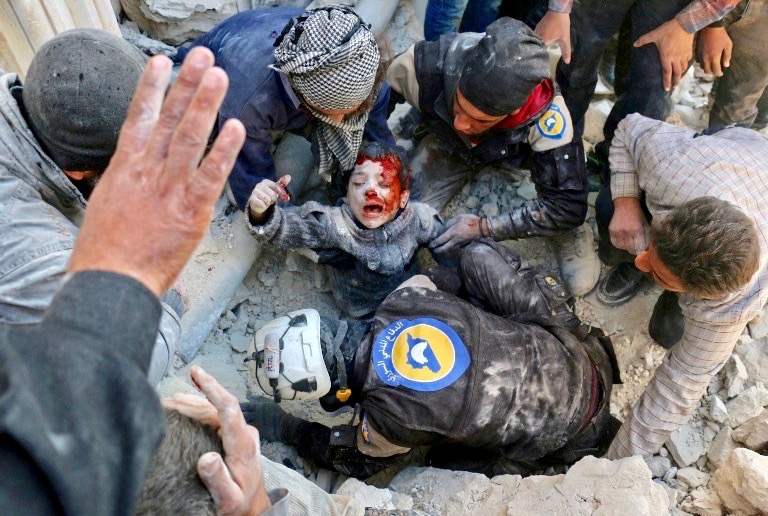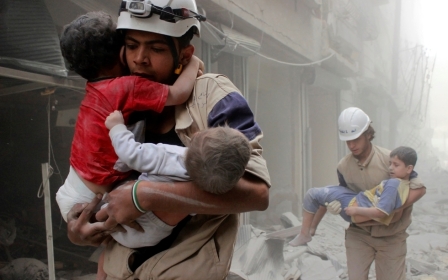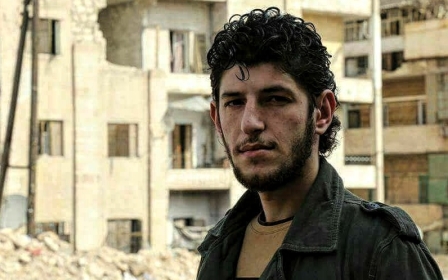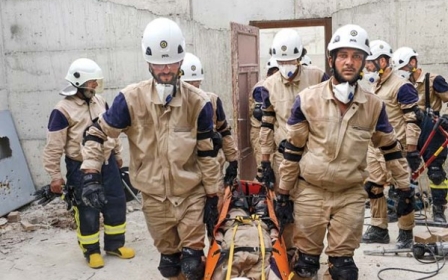Syria's White Helmets get visas to travel to US for Oscars

Two Syrian rescue workers said they plan to travel to next week's Oscar ceremony, where their documentary The White Helmets is nominated for an award, after weeks of uncertainty over their plans caused by US President Donald Trump's travel ban.
Raed Saleh, the leader of the White Helmets, and cinematographer Khaled Khatib have both obtained visas to travel to the US for the 26 February Academy Award ceremony in Los Angeles, producer Joanna Natasegara said.
"They both have valid visas. We remain cautious about the physical part of entering the country. Things had been very unclear until this point, but we are now being told they are welcome to enter," Natasegara said.
"We got our visas yesterday, but we're not yet sure if we'll be able to travel or not," Saleh said by phone on Saturday.
"We don't want to have problems at the borders or the airport," he said.
"The White Helmets are among the most inspiring humanitarians we have ever known, and it is the greatest honour to share a global platform where their incredible work can be recognised. ... In these uncertain times, their story is one of the most moving of our generation," Natasegara said in a joint statement with director Orlando von Einsiedel.
The White Helmets, nominated in the Oscars short subject documentary category, gives a glimpse of the daily lives of the civilian Syrian Civil Defence, whose members volunteer as rescue workers in the war-ravaged country.
"It is important that people understand that Syria has people who want the same things they want: peace, jobs, family, and to live without the fear of bombs. This is what I hope the film does," Khatib said in a statement on Friday.
Since it emerged in 2013, the rescue group has attracted more than 3,000 volunteers and says it has saved more than 78,000 lives.
It is named for the distinctive white hard-hats worn by its volunteers and has gained international renown for its daring rescues, often filmed and circulated on social media.
"With so many people watching, it would be such an important opportunity to talk about the suffering happening in Syria," Saleh said.
More than 310,000 people have died since Syria's conflict erupted in March 2011, and more than half the country's citizens have been forced to flee their homes.
"The documentary took a lot of effort to make, and we've been working on it for a long time. People who are featured in the film have since died. There's equipment that you see that has been destroyed," Saleh said.
"This film is history for us. We hope that we win the Oscar because that would provide moral support to the White Helmets and show them that their sacrifices weren't for nothing."
Last month, it looked as if the Syrian filmmakers would be unable to get to the Oscars because of Trump's executive order that barred entry to the US for citizens from Iran, Iraq, Libya, Somalia, Sudan, Syria and Yemen for 90 days.
US appeals court judges last week blocked Trump's travel ban, but the Republican president has said he plans to issue a new order soon.
Iranian director Asghar Farhadi and actress Taraneh Alidoosti, who stars in his foreign-language nominated film The Salesman, have said they will boycott the Academy Awards in protest against Trump's travel restrictions.
New MEE newsletter: Jerusalem Dispatch
Sign up to get the latest insights and analysis on Israel-Palestine, alongside Turkey Unpacked and other MEE newsletters
Middle East Eye delivers independent and unrivalled coverage and analysis of the Middle East, North Africa and beyond. To learn more about republishing this content and the associated fees, please fill out this form. More about MEE can be found here.




